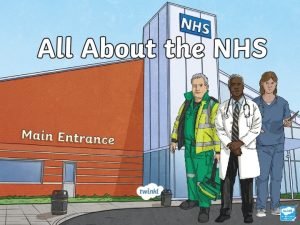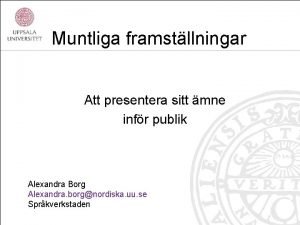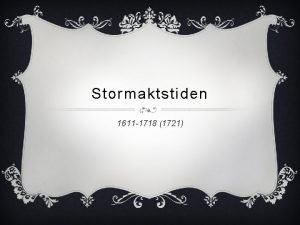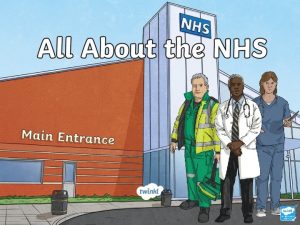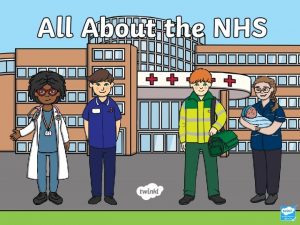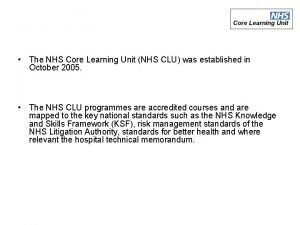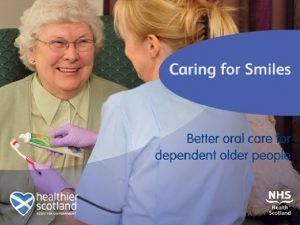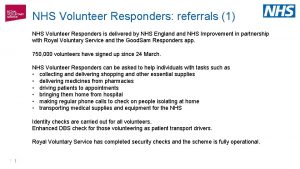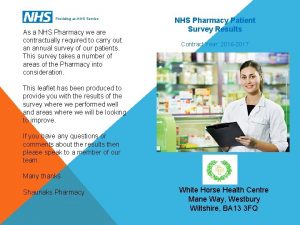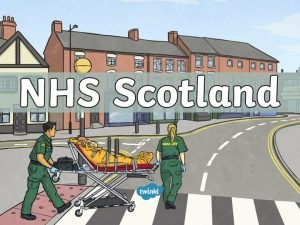What Is the NHS The NHS stands for















- Slides: 15


What Is the NHS? The NHS stands for the UK’s National Health Service. People who work in the NHS keep people healthy. They help those in the UK who are feeling unwell or are injured.

When Do We Use the NHS? Think about times when you have been helped by someone who works for the NHS. Who helped you when you were injured? Who gave you medicine when you were unwell? Who would help you if you had a medical emergency?

Life Before the NHS We haven’t always had a National Health Service which is available for all in the way it is today. Before having the NHS, only wealthy people could afford to go to hospital or get medical help. Every visit to a doctor or operation would cost the person money. If the person could not afford it, they did not get the medicine or the treatment.

Aneurin Bevan decided to change things. Aneurin Bevan was a Welsh Labour Party politician. After the Second World War, Aneurin Bevan was chosen as the Minister of Health in the Labour government. He started the National Health Service on 5 th July 1948. He wanted a system which provided medical care which was free at point-ofneed for everyone within the UK, regardless of wealth.

How Does It Work? Every person in the United Kingdom can get medical help when they need it, without paying a bill. The NHS was made so that every person within the United Kingdom could access medical help, treatment and advice, no matter how much money they had. This works by every working adult paying taxes (money) to the government, which is then used to pay for the NHS and the NHS staff.

NHS Staff There are many different people who work within the NHS. Some you might immediately think of and others you might not have thought of at first. Every single person and role is important for the NHS to work together as a system of health for the country. nurses doctors Nurses see carepatients for patients. They might take Doctors in doctor’s surgeries yourhospitals. temperature, a wound or give and They clean diagnose the problem youcan an injection, such as a Some vaccination. and prescribe medicine. doctors perform surgery. ambulance service team health professionals Telephone allied operators answer people’s 999 calls and work out what These help ispeople neededwork in each respond withemergency. patients by. Paramedics helping them and give people first aid. or They use an treatment, ambulance e. g. to get to be rehabilitated providing patients to hospital as quickly as possible. hospital chaplains, physiotherapists.

NHS Staff There are many different people who work within the NHS. Some you might immediately think of and others you might not have thought of at first. Every single person and role is important for the NHS to work together as a system of health for the country. dental team health informatics Staff at a dental surgery work together to keep your teeth clean and These people get. A information the right people healthy. dental nursetomight polish your teeth. A dentist might at the give rightyour timetooth through electronic records a filling or even take aortooth out. The office staff spotting trends in diseases and treatments. book all the appointments. They help other people make decisions. healthcare scientists NHS scientists look for ways to help save lives and make lives better through research.

NHS Staff There are many different people who work within the NHS. Some you might immediately think of and others you might not have thought of at first. Every single person and role is important for the NHS to work together as a system of health for the country. management The NHS managers have to make sure the pharmacists system runs smoothly. They use their budget Pharmacists ready NHS for patients. to workget outmedicine how to spend money. They give people advice on taking theand right allocate staff to each hospital, more. medicine to recover. midwives Midwives care for pregnant women. They help to deliver the baby and to keep the mother and baby healthy afterwards.

NHS Staff There are many different people who work within the NHS. Some you might immediately think of and others you might not have thought of at first. Every single person and role is important for the NHS to work together as a system of health for the country. psychological wider healthcare team professionals workers support people’s There are lots of. These people. NHS needed to make the NHS work, andchefs, mental wellbeing. such as cleaners, minds porters, building staff and more. Did you know about all these public health team Which jobs were different jobs new to you? The public healthwithin teamthe are. NHS? in charge of making sure that we know how to live healthy lives and what to do if we are unwell.

What is PPE? P – Personal P – Protective E – Equipment Why is PPE important for the NHS? PPE is important to keep NHS workers safe in the workplace or on home visits when they are likely to come into contact with suspected or confirmed diseases or bacteria. Healthcare workers may be required to use equipment, follow procedures or instructions, take part in training or work under supervision to ensure work is carried out safely.

Lungs Where necessary, a filtered facepiece or respirator may be worn to prevent gases, dust, vapours or bacteria entering the lungs. It’s important to note that to be effective, these must be filtered. Whole Body Where necessary, aprons, boiler suits or overalls may be worn to prevent the wearer against heat, contaminated fluid or dust or the impact of harmful objects. Types of PPE Eyes Click each safety Where necessary, arrow to show glasses or goggles or a face information shield may be worn to about PPE for prevent flying particles or each area. bacteria entering the eyes. Hands and Arms Where necessary, gloves or sleeves that cover part or all of the arm may be worn to prevent contact with hazards such as extreme temperatures, chemicals, radiation or bacteria touching the skin.

NHS Timeline 1948 – The NHS was created (launched by Aneurin Bevan). 1952 – People had to start paying a small fee to have medicine prescribed. 1958 – The first big vaccination programme started, protecting lots of people from diseases called polio and diphtheria. 1962 – The Hospital Plan started, ensuring that there were enough hospitals to treat everyone. 1968 – The UK’s first heart transplant happened. 1972 – CT scanners were used for the first time to create detailed images of bodies, helping to diagnose injuries and illnesses. 1994 – The organ donor register was created, meaning that people could volunteer to donate their organs after they died. 2006 – Patient choice was created (where patients could choose which hospital they attend). 2018 – The NHS turned 70.

NHS Timeline In what year did the NHS turn 70? 2018 Which Labour MP created the NHS? Aneurin Bevan Before the NHS, what did people have to do if they needed medical help? Pay money for it. When were charges for prescriptions first introduced? 1952 Are doctors and nurses the only people who work for the NHS? No, the NHS is made up of many different working roles and people.

 What does nhs stand for
What does nhs stand for Nhs stands for
Nhs stands for Tack för att ni har lyssnat
Tack för att ni har lyssnat Verifikationsplan
Verifikationsplan Tidböcker
Tidböcker Rutin för avvikelsehantering
Rutin för avvikelsehantering Geometri för barn
Geometri för barn Presentera för publik crossboss
Presentera för publik crossboss Rbk-mätning
Rbk-mätning Fspos vägledning för kontinuitetshantering
Fspos vägledning för kontinuitetshantering Etik och ledarskap etisk kod för chefer
Etik och ledarskap etisk kod för chefer Kung dog 1611
Kung dog 1611 Tack för att ni har lyssnat
Tack för att ni har lyssnat Tobinskatten för och nackdelar
Tobinskatten för och nackdelar Tack för att ni lyssnade bild
Tack för att ni lyssnade bild Referatmarkering
Referatmarkering

